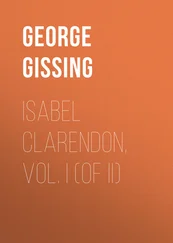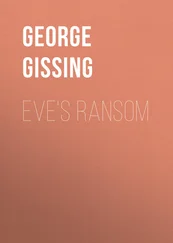George Gissing - Will Warburton
Здесь есть возможность читать онлайн «George Gissing - Will Warburton» — ознакомительный отрывок электронной книги совершенно бесплатно, а после прочтения отрывка купить полную версию. В некоторых случаях можно слушать аудио, скачать через торрент в формате fb2 и присутствует краткое содержание. Жанр: foreign_prose, literature_19, foreign_antique, на английском языке. Описание произведения, (предисловие) а так же отзывы посетителей доступны на портале библиотеки ЛибКат.
- Название:Will Warburton
- Автор:
- Жанр:
- Год:неизвестен
- ISBN:нет данных
- Рейтинг книги:4 / 5. Голосов: 1
-
Избранное:Добавить в избранное
- Отзывы:
-
Ваша оценка:
- 80
- 1
- 2
- 3
- 4
- 5
Will Warburton: краткое содержание, описание и аннотация
Предлагаем к чтению аннотацию, описание, краткое содержание или предисловие (зависит от того, что написал сам автор книги «Will Warburton»). Если вы не нашли необходимую информацию о книге — напишите в комментариях, мы постараемся отыскать её.
Will Warburton — читать онлайн ознакомительный отрывок
Ниже представлен текст книги, разбитый по страницам. Система сохранения места последней прочитанной страницы, позволяет с удобством читать онлайн бесплатно книгу «Will Warburton», без необходимости каждый раз заново искать на чём Вы остановились. Поставьте закладку, и сможете в любой момент перейти на страницу, на которой закончили чтение.
Интервал:
Закладка:
"If only you could see the comical side of it, mother," replied Bertha. "It really has one, you know. Emma, if only you would be patient with her, is a well-meaning creature, and she says the funniest things. I asked her this morning if she didn't think she could find some way of remembering to put the salt on the table. And she looked at me very solemnly, and said, 'Indeed, I will, miss. I'll put it into my prayers, just after 'our daily bread.'"
Mrs. Cross saw nothing in this but profanity. She turned the attack on Bertha, who, by her soft way of speaking, simply encouraged the servants, she declared, in negligence and insolence.
"Look at it in this way, mother," replied the girl, as soon as she was suffered to speak. "To be badly served is bad enough, in itself; why make it worse by ceaseless talking about it, so leaving ourselves not a moment of peace and quiet? I'm sure I'd rather put the salt on the table myself at every meal, and think no more about it, than worry, worry, worry over the missing salt-cellars from one meal to the next. Don't you feel, dear mother, that it's shocking waste of life?"
"What nonsense you talk, child! Are we to live in dirt and disorder? Am I never to correct a servant, or teach her her duties? But of course everything I do is wrong. Of course you could do everything so very much better. That's what children are nowadays."
Whilst Mrs. Cross piped on, Bertha regarded her with eyes of humorous sadness. The girl often felt it a dreary thing not to be able to respect—nay, not to be able to feel much love for—her mother. At such times, her thought turned to the other parent, with whom, had he and she been left alone, she could have lived so happily, in so much mutual intelligence and affection. She sighed and moved away.
The unlet house was a very serious matter, and when one day Norbert Franks came to talk about it, saying that he would want a house very soon, and thought this of Mrs. Cross's might suit him, Bertha rejoiced no less than her mother. In consequence of the artist's announcement, she wrote to her friend Rosamund, saying how glad she was to hear that her marriage approached. The reply to this letter surprised her. Rosamund had been remiss in correspondence for the last few months; her few and brief letters, though they were as affectionate as ever, making no mention of what had formerly been an inexhaustible topic—the genius, goodness, and brilliant hopes of Franks. Now she wrote as if in utter despondency, a letter so confused in style and vague in expression, that Bertha could gather from it little or nothing except a grave doubt whether Franks' marriage was as near as he supposed. A week or two passed, and Rosamund again wrote—from Switzerland; again the letter was an unintelligible maze of dreary words, and a mere moaning and sighing, which puzzled Bertha as much as it distressed her. Rosamund's epistolary style, when she wrote to this bosom friend, was always pitched in a key of lyrical emotion, which now and then would have been trying to Bertha's sense of humour but for the sincerity manifest in every word; hitherto, however, she had expressed herself with perfect lucidity, and this sudden change seemed ominous of alarming things. Just when Bertha was anxiously wondering what could have happened,—of course inclined to attribute blame, if blame there were, to the artist rather than to his betrothed—a stranger came to inquire about the house to let. It was necessary to ascertain at once whether Mr. Franks intended to become their tenant or not. Mrs. Cross wrote to him, and received the briefest possible reply, to the effect that his plans were changed.
"How vexatious!" exclaimed Mrs. Cross. "I had very much rather have let to people we know I suppose he's seen a house that suits him better."
"I think there's another reason," said Bertha, after gazing for a minute or two at the scribbled, careless note. "The marriage is put off."
"And you knew that," cried her mother, "all the time, and never told me! And I might have missed twenty chances of letting. Really, Bertha, I never did see anything like you. There's that house standing empty month after month, and we hardly know where to turn for money, and you knew that Mr. Franks wouldn't take it, and yet you say not a word! How can you behave in such an extraordinary way? I think you really find pleasure in worrying me. Any one would fancy you wished to see me in my grave. To think that you knew all the time!"
CHAPTER 12
There passed a fortnight. Bertha heard nothing more of Miss Elvan, till a letter arrived one morning in an envelope, showing on the back an address at Teddington. Rosamund wrote that she had just returned from Switzerland, and was staying for a few days with friends; would it be possible for Bertha to come to Teddington the same afternoon, for an hour or two's talk? The writer had so much to say that could not be conveyed in a letter, and longed above all things to see Bertha, the only being in whom, at a very grave juncture in her life, she could absolutely confide. "We shall be quite alone—Mr. and Mrs. Capron are going to town immediately after lunch. This is a lovely place, and we shall have it to ourselves all the afternoon. So don't be frightened—I know how you hate strangers—but come, come, come!"
Bertha took train early in the afternoon. By an avenue of elms she passed into a large and beautiful garden, and so came to the imposing front door. Led into the drawing-room, she had time to take breath, and to gaze at splendours such as she had never seen before; then with soundless footfall, entered a slim, prettily-dressed girl who ran towards her, and caught her hands, and kissed her with graceful tenderness.
"My dear, dear old Bertha! What a happiness to see you again! How good of you to come! Isn't it a lovely place? And the nicest people. You've heard me speak of Miss Anderton, of Bath. She is Mrs. Capron—married half a year ago. And they're just going to Egypt for a year, and—what do you think?—I'm going with them."
Rosamund's voice sunk and faltered. She stood holding Bertha's hands, and gazing into her face with eyes which grew large as if in a distressful appeal.
"To Egypt?"
"Yes. It was decided whilst I was in Switzerland. Mrs. Capron wants a friend to be with her; one who can help her in water-colours. She thought, of course, that I couldn't go; wrote to me just wishing it were possible. And I caught at the chance! Oh, caught at it!"
"That's what I don't understand," said Bertha.
"I want to explain it all. Come into this cosy corner. Nobody will disturb us except when they bring tea.—Do you know that picture of Leader's? Isn't it exquisite!—Are you tired, Bertha? You look so, a little. I'm afraid you walked from the station, and it's such a hot day. But oh, the loveliness of the trees about here! Do you remember our first walk together? You were shy, stiff; didn't feel quite sure whether you liked me or not. And I thought you—just a little critical. But before we got back again, I think we had begun to understand each other. And I wonder whether you'll understand me now. It would be dreadful if I felt you disapproved of me. Of course if you do, I'd much rather you said so. You will—won't you?"
She again fixed her eyes upon Bertha with the wide, appealing look.
"Whether I say it or not," replied the other, "you'll see what I think. I never could help that."
"That's what I love in you! And that's what I've been thinking of, all these weeks of misery—your perfect sincerity. I've asked myself whether it would be possible for you to find yourself in such a position as mine; and how you would act, how you would speak. You're my ideal of truth and rightness, Bertha; I've often enough told you that."
Bertha moved uncomfortably, her eyes averted.
Читать дальшеИнтервал:
Закладка:
Похожие книги на «Will Warburton»
Представляем Вашему вниманию похожие книги на «Will Warburton» списком для выбора. Мы отобрали схожую по названию и смыслу литературу в надежде предоставить читателям больше вариантов отыскать новые, интересные, ещё непрочитанные произведения.
Обсуждение, отзывы о книге «Will Warburton» и просто собственные мнения читателей. Оставьте ваши комментарии, напишите, что Вы думаете о произведении, его смысле или главных героях. Укажите что конкретно понравилось, а что нет, и почему Вы так считаете.












